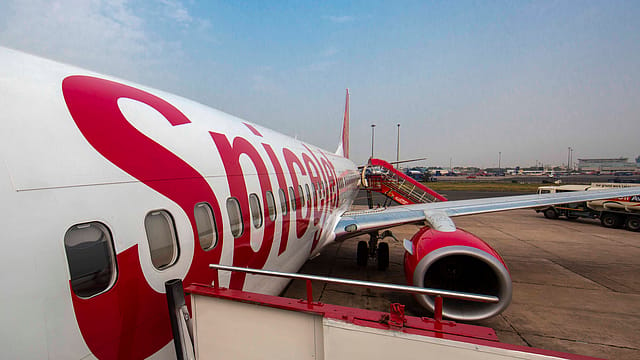SpiceJet ordered to draw engine oil samples every 15 days after smoke in cabin
ADVERTISEMENT

The aviation regulator Directorate General of Civil Aviation (DGCA) has issued some key directions to SpiceJet, which experienced smoke in its cabin on October 12, 2022, the latest incident in a series of tech snags that have earned a bad name for the airline of late. The regulator has said it's keeping a close watch on the overall situation and will take all appropriate actions to avert any untowards incident.
The said SpiceJet flight (SG 3735), which was en route to Goa, made an emergency landing at around 11 pm on October 12, after smoke was observed inside the cabin. There were 86 passengers onboard the flight. The aircraft had landed safely and no passenger was hurt.
The aviation regulator said it's still investigating the incident. However, based on a preliminary probe, it has found evidence of "engine oil" in the "engine bleed-off valve". It led to the oil entering the aircraft air conditioning system, and resulted in smoke inside the cabin. Following this, the aircraft had to make an emergency landing.
SpiceJet has been on the DGCA’s radar for negligence in flight operations for quite a while now. In light of repeated tech snags, the regulator on July 27 asked the airline to operate at a 50% capacity for eight weeks and later extended the curbs till October 29.
Now this time, SpiceJet has been asked to take a series of measures to stop such incidents from happening again. First, it'll send engine oil samples to Pratt & Whitney, Canada, for PW51A oil analysis to ascertain the presence of metal and carbon seal particles. It has also been asked to inspect "bleed-off valve screen and housing for evidence of oil wetness".
SpiceJet has also been asked to periodically draw engine oil samples after 15 days, instead of present 30 days, to Pratt & Whitney-Canada for oil analysis. This will ascertain the presence of metal and carbon seal particles. Also, it'll ensure a one-time "boroscopic inspection" of all operational engines within a week. It has also been told to conduct boroscopic inspection on the three engines received from Standard Aero, Singapore.
SpiceJet, on a weekly basis, will also bleed-off valve screens and check oil wetness. SpiceJet will also conduct the inspection of magnetic chip detectors (MCD) to detect the presence of any metal particles "on reporting of fault 938 in the central display system, which otherwise is a class 2 fault and calls for inspection within the next 65 flights houses". The DGCA says if any metal particles are detected, the engine's boroscopic inspection will be carried out prior to the aircraft's release.
There have been a chain of incidents involving SpiceJet, which has dented its reputation. Last month, a SpiceJet flight en route to Guwahati was delayed for over an hour, with 198 passengers onboard, due to a technical glitch. In April, the DGCA suspended 90 SpiceJet pilots from operating Boeing 737 Max aircraft, after finding they were not properly trained. The watchdog also slapped a fine of ₹10 crore on the airline over the issue.
Apart from having operational snags, the airline is facing a double-whammy of financial constraints. Last month, it sent 80 pilots on a three-month leave without pay to rationalise costs. In the past months, several SpiceJet employees have held demonstrations over delayed salaries.
Since 2020, SpiceJet has accumulated a loss of more than ₹2,000 crore to its vendors, including lessors. In the April-June quarter, it posted a loss of ₹789 crore. To survive, the airline has secured ₹220 crore through the government’s recent emergency credit loan guarantee scheme (ECLGS). Last month, it slipped from the second position to the fifth position in terms of market share. The SpiceJet share closed 0.90% or 0.35 points down at ₹38.50 on NSE today.